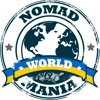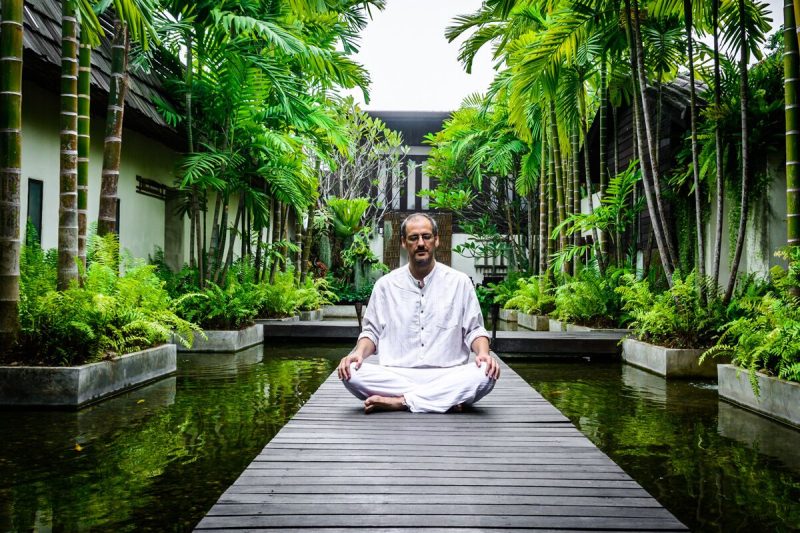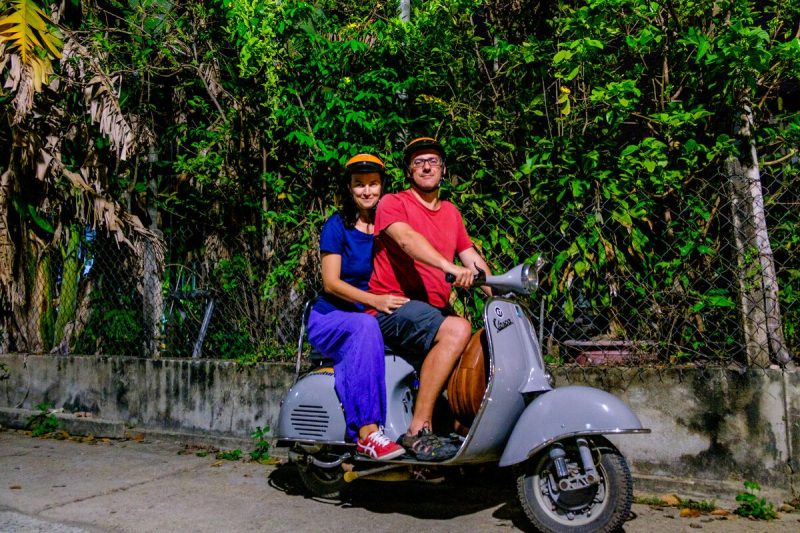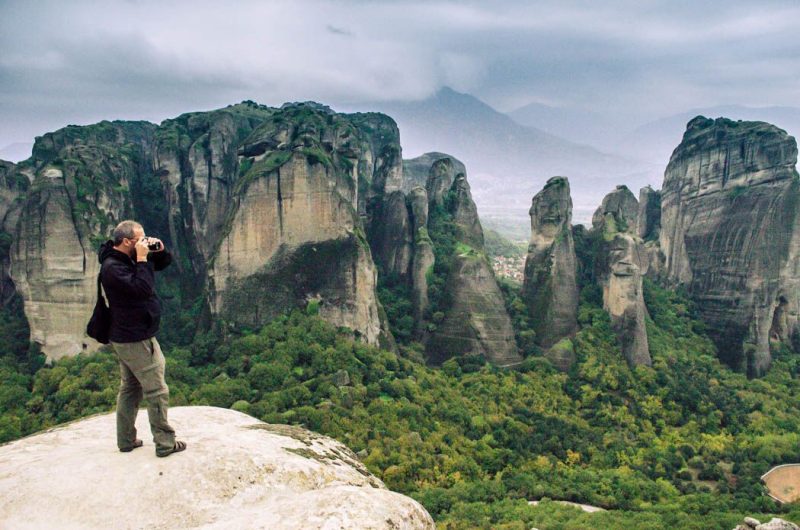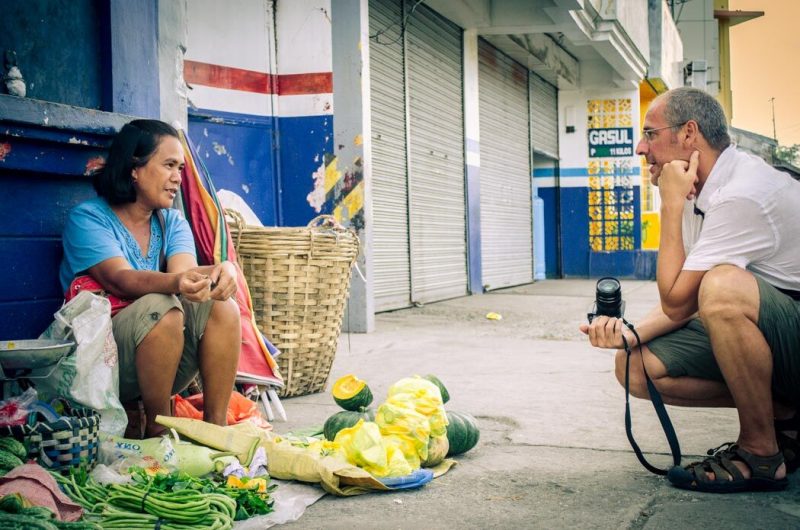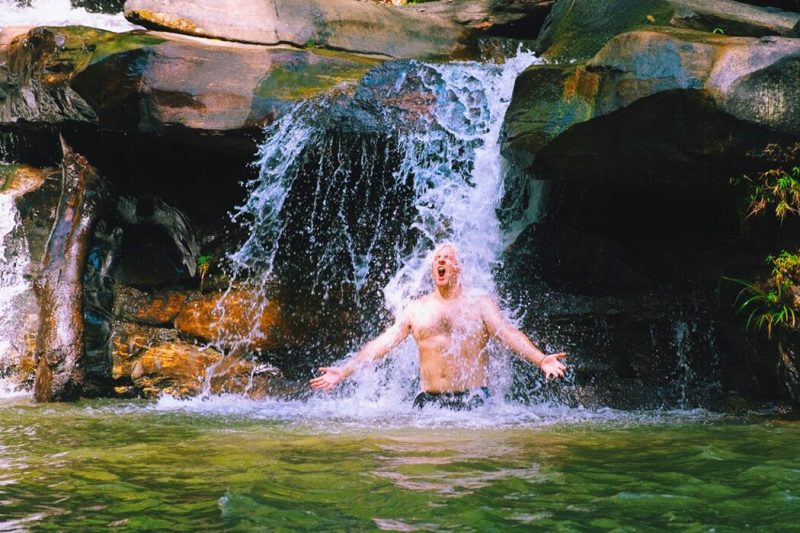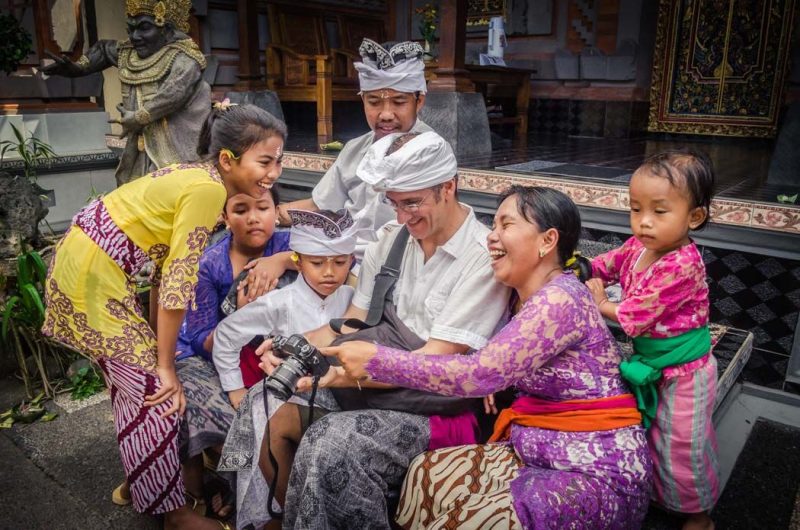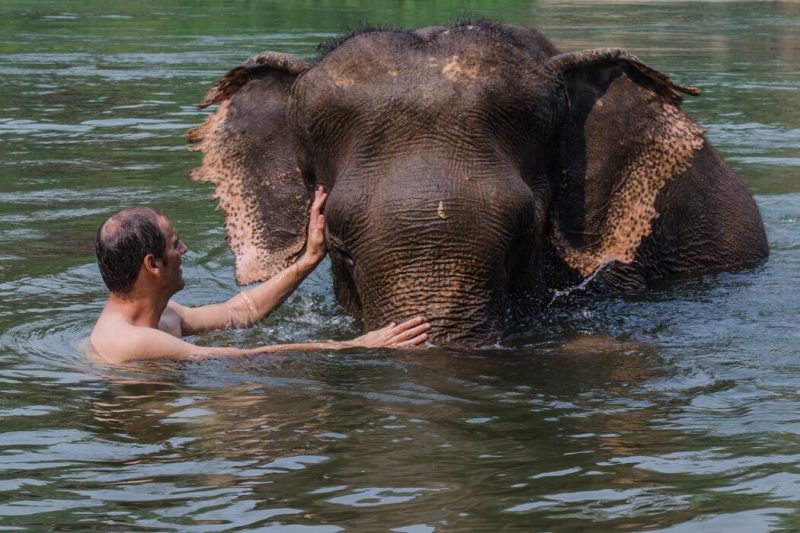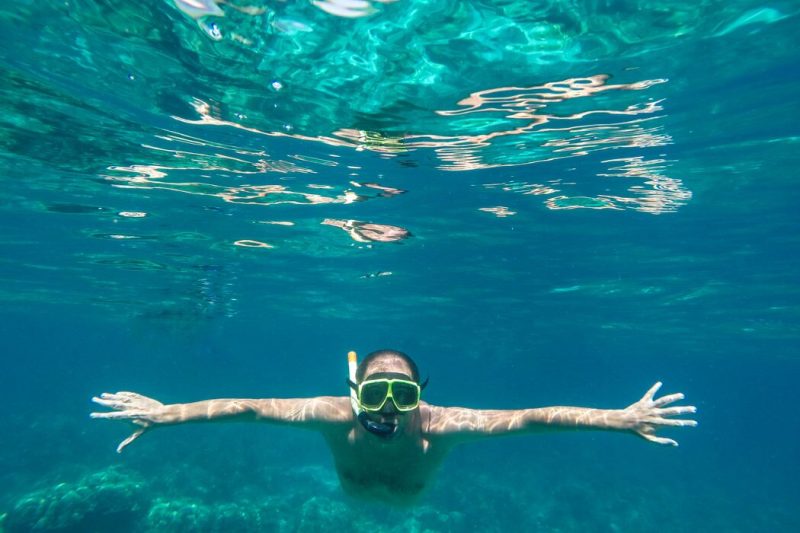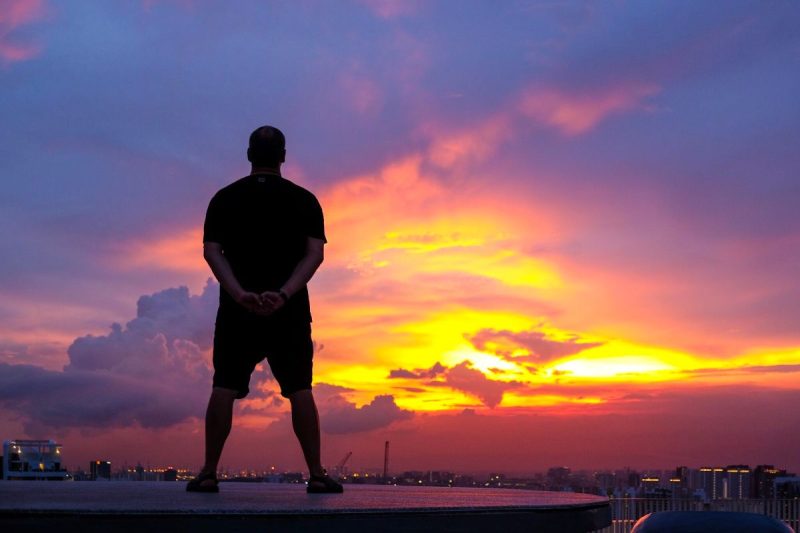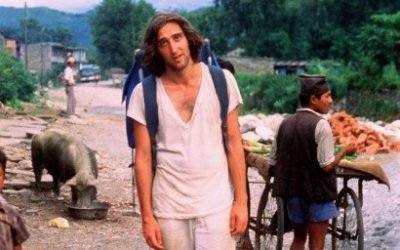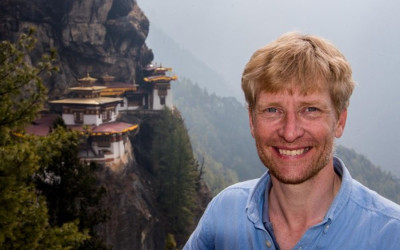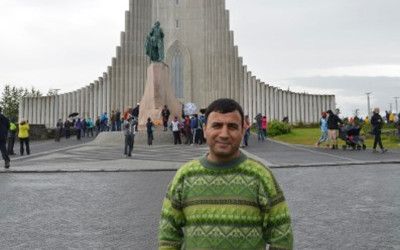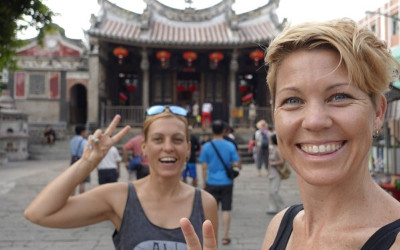As part of our commitment to showcase all kinds of travellers, great and small, today we interview Gianni who may ‘only’ have visited 42 UN countries but has been on the road continuously for 5 years. The man behind the website Nomad is Beautiful, frequently travelling with his partner Ivana, he talks to us about being on the road all the time…
Gianni, tell us about your childhood and how your love for travel developed.
I was a kid with an endless curiosity. Always loved to observe things, ask thousands of questions. I also adored colors, pencils, and when I was 10, I did this drawing of a clown with a suitcase.
The suitcase was full of stickers of different cities of the world, New York, Paris, London… Thinking about the drawing now, I might have subconsciously depicted myself traveling the world.
At 13 I decided to learn English and foreign languages. My dream was to work as a flight attendant. That’s how my studies at a linguistic high school began.
In summer, at the age of 14, we went for a school trip to Paris which was my first travel abroad. Naturally, I was super happy to be there, tasting new food, listening to people speaking a different language, the music of the street artists, seeing the Eiffel Tower in real life, going for a boat trip on the Seine. I then realized I really loved travelling to different countries outside Italy.
How Italian do you feel? What does it mean to be ‘Italian’, what stereotypes are true and what are not? And how does being Italian influence your travelling?
Despite the fact I left Italy 15 years ago, lived in England and Germany, and now I am nomadic; I am 100% Italian when it comes to pizza and the love for food and cooking. Wherever I travel to, I always look for an Italian pizzeria. I’ve been on my personal “Italian pizza hunt” since 2013, trying to find the best one.
But I am not a typical Italian regarding coffee, football, cars, and fashion, as I am not a fan of them.
I do gesticulate a lot, and sometimes I deliberately exaggerate to make people laugh about my “Italianity.” Interestingly enough, I’ve noticed people gesticulate in many countries. It’s just that they don’t have the same variety of gestures as we do.
Surely, many stereotypes are true. But we don’t have mafia gangsters going around the streets killing people or asking for bribes from every business. If we talk about mafia in Italy, we talk about an underground reality, the same as in many other countries of the world.
Also, Italy doesn’t have sun all the year around. It can be very cold in winter months, including the southern regions. In some ways, being Italian helps me in my travels. Italy is a world famous country. Almost everyone knows pizza, spaghetti, or can name an Italian football team, a player, or a singer.
People usually become friendlier when I say I am an Italian. Either they have visited the country, or they want to go there. Sometimes they just try to speak some words or make a gesture.
You travel with Ivana from Slovakia. What are the pluses and minuses of travelling together?
Travelling as a couple and living together 24/7, 365 days a year can be challenging but also can be very rewarding.
We love sharing the moments of discovery together. Seeing how we feel about a new country, how we cope with the challenges of adapting ourselves to a new environment.
How we react to new food, new languages, or just sharing the happiness of being on the road together.
We help each other a lot when it comes to practical things like dealing with touts in crowded places, interacting with locals in a language that only one of us can speak, getting through a challenging bus or train route. These are daily challenges that are easier to go through when you travel with someone else.
On the other side, because we travel as a couple, sometimes we might miss experiences with locals that are easier for a solo traveler. In general, people are more confident to approach a stranger when he or she is alone.
As a couple, we might be seen as a closed “nucleus,” that could be more challenging to interact with. But we do our best to open ourselves to locals. There are many amazing and unforgettable experiences with locals we have had as a couple.
To stay sane on the road, we take a “day off” not only from work, but also from each other. A day where we can explore a city alone, take pictures, write, do yoga, or enjoy a coffee without going together. That way we also have some time to contemplate our own thoughts and ideas.
Recently we’ve experimented with travelling solo in different countries. Ivana was in Kyrgyzstan and I was in South Korea and Japan. We loved it and would love to repeat it again.
You have been on the road for more than 5 years nonstop. So, tell us about your average week, what you do, how you plan where you will go next, and how you deal with being eternal nomads – do you ever miss home?
Honestly, I still have to find a good way to manage my life on the road. Especially when you have an online business it can be hard to work and visit the places at the same time. That’s why I prefer travelling very slowly, spending 2/3 months in one country or even in one city or a village. So far the best way to keep the balance for me was switching from working mode to a travel one regularly.
During the working mode I try to have a regular daily routine, no matter if I sleep in a hotel, a guesthouse, or an apartment. Part of the routine is morning meditation with cold showers that are an amazing energizer and that help me set my mind right and kick off the work. When in a working mode, most of the day we dedicate entirely to work, for 8 to 10 hours. When in travel mode, we work only a couple of hours a day, and the rest of the time we spend sightseeing, hiking or wandering around local markets.
When we stay long-term in one place, we like mixing work and fun. So we would work half day and then explore the rest of the time the city where we stay.
Regarding travel plans, it depends on many factors, like whether we get a house sitting assignment, if we are working on a promotional long-term campaign with a tourism board, or maybe if I find a cheap flight to a country I want to visit. Many times I come back to countries I have already visited, simply because I like it there and I want to explore more.
The difficult part of being an eternal nomad is related to not having a physical address. Bureaucracy is still far from dealing with the reality of digital nomadism and remote work. For all the rest, you learn to adapt to everything.
I have to say I don’t miss home, if we mean Italy or my town. However, sometime I miss having a home base, a place where I could come back every now and then. But the more I travel the more I postpone this idea.
You only have hand luggage, meaning you have given up on material things while you travel. So what do you have with you? And what everyday things you don’t have do you most miss?
I travel with 10kg carry-on luggage and love this minimalist way of travelling. It helps you to board a plane quickly, to leave the airport, (I never do the check-in) catching a train or getting in a bus fast. I can walk for an hour while looking for accommodation or strolling in a town without getting tired. A huge bonus is being able to pack within 10 minutes.
70% of my stuff is electronics. Laptop, camera, Gopro, cables, drives, Kindle, also a small drone. The rest is clothes and toiletries reduced to the essentials.
Unfortunately, for this reason I can’t travel to cold countries, as I am not equipped for snowy weather. I don’t really miss anything, and if so, I just buy it on the road. Carrying superfluous stuff, or too many clothes and shoes on your shoulders kills the fun of travelling. Travelling is freedom, and having too much stuff doesn’t make you free anymore.
Of your many travel experiences, which are a few that really made a difference to you?
At the beginning of my nomadic travels I had a chance to volunteer with an organization that was working to recover natural habitat of elephants in Thailand. These amazing mammals are some of the most sweet and intelligent animals on the planet. I learnt how they are exploited and even tortured by many companies to please the irresponsible tourists who want to ride them.
I never rode an elephant, but I swam with one of them. Sombat was a retired blind elephant that worked for many years in harsh conditions of touristic elephant riding. It was a profound experience that made me realize how much we need to respect the animals the same way we do respect local culture.
The world out there isn’t there solely for our entertainment. After the volunteer experience, I decide more consciously whether to participate in certain adventure activities or not.
We should all ask ourselves if any experience we are about to do helps anyone or makes their lives better or opposite – will it exploit, ruin, or waste the lives of locals, animals or the environment?
You are very involved in blogging and have your own blog, Nomad is Beautiful. Tell us something about this, how much time it takes, the challenges and rewards of this.
We launched the blog within a week after we hit the road. The idea was to create a business online that could sustain our travels. But also to enjoy and develop our passions which are writing, photography, and videos.
To run a blog takes a lot of time and efforts. Especially if you want to run it as a business. Similar to all businesses, you need to be professional, always learn new skills, get inspired by other professional bloggers, and be persistent. It takes time. But it’s all worth once you reach a certain level of traffic.
It is also rewarding on a human level. In these years thanks to the blog we’ve met and became friends of wonderful people. Some of them are part of our team, too. We were very lucky to meet other wonderful travellers, bloggers, and even readers of our blog.
So what’s the plan then? Travelling for the rest of your life? And what are your ultimate travel goals?
At this point it’s really hard to stop. Once you have made your life nomadic, it’s addictive in a good way. You can’t stop. You can stay longer in some places, but you’ll always have the desire to move and explore again inside you.
The world we live is an amazing place, seeing it with our own eyes is a fulfilling experience of learning about it and about ourselves one can have.
I’ve been only to 40+ countries so far, and this year I will be 50 years old. So my plan is to do 100 countries in my 50’s. Seeing half of the world countries sounds like a good goal for now.
What were the last three places you were in, and where do you expect to go in the next few months?
I am now in Colombia and before I was in Mexico, Japan and South Korea. For the summer I am planning still to stay in this part of the world, (Americas) and in autumn I am hoping to explore some more countries in Europe where I have never been.
Finally, our signature question – if you could invite any 4 people from any period in human history to dinner, who would you invite and why?
Tiziano Terzani
An Italian journalist and writer that lived for many years in Asia. He worked for the German magazine “Der Spiegel” and he has inspired generations of travelers with his articles and books. Terzani was a kind and wise man that has seen many important events in the history. He saw the fall of Saigon to the end of the Viet Cong and the fall of the Khmer Rouge regime. I’d love to chat with him about Asia before it was inundated by hordes of tourists. It would be great to listen to his stories and learn from him how to become a better traveler, writer and human being.
J.R.R. Tolkien
Another writer whose books inspired me to live my life “as an adventure” with all the challenges and the rewards that the road has given to me. It would be fun to watch the movies of Peter Jackson based on his books and see his reactions, if he likes what is on screen, if he imagined the hobbits, Gollum, the elves, the orcs the same way, and listen to his stories about the mythology and the imaginary world he created.
Che Guevara
I studied his work and life at university. This man was a practical dreamer who really wanted to change the condition of the poor, the farmers, the humble people of Central and South America. Besides being a revolutionary, a guerrilla leader and a military theorist, he was an intellectual, a physician, a writer, and a traveller. He travelled with a motorcycle through all South America, and as we all know he was one of the main protagonists of the Cuban Revolution. I would like to ask him what he thinks of what is Cuba now and what he would do to change the condition of the poor people in the region today.
W.S. Burroughs
An American writer considered to be the godfather of the Beat Generation. Author of a controversial book Naked Lunch and friend of Jack Kerouac (On the Road). He influenced a lot of the modern culture, including movie makers, writers, musicians. He was also a traveller, exploring Central and South America, living in Morocco, Paris, and London. I read many of his books in order to complete my university thesis about his work. But surely, a real chat about his life, writings, art, and what he thinks of contemporary culture would be a completely different experience.
The photos in this interview are from Gianni’s personal collection and we thank him for sharing his images with us here at NomadMania!
